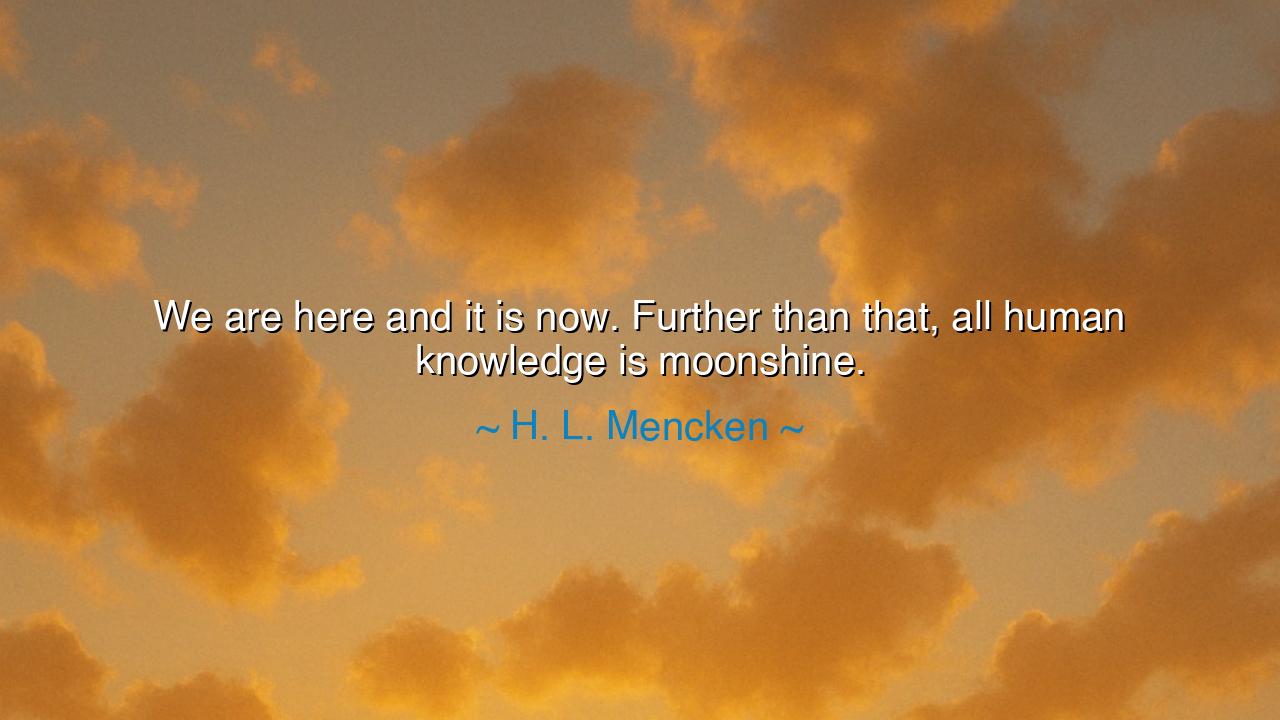
We are here and it is now. Further than that, all human knowledge






Hear, O seekers of truth, the words of H. L. Mencken, sharp as a blade and piercing as an arrow: “We are here and it is now. Further than that, all human knowledge is moonshine.” In this saying lies a paradox both humbling and profound. For Mencken, ever the skeptic of human pretension, reminds us that the present moment is the only certainty we truly possess. All else—whether theories of the heavens, predictions of tomorrow, or boasts of eternity—is but shadow and mist, a silver glow like moonshine, beautiful to behold yet without substance to grasp.
What is it to say, “We are here and it is now”? It is the recognition that existence itself is our anchor. The past has slipped from our fingers like sand, the future is hidden beyond the veil, but this instant—this breath, this heartbeat—is real, tangible, undeniable. The wisest among the ancients knew this. The Stoics spoke of living in accordance with the present, not enslaved by regret or enslaved by hope. Lao Tzu, too, whispered that the eternal Tao is found not in speculation, but in harmony with the moment. Mencken, though of another age, echoes the same eternal song: cling not to what is uncertain, but dwell in the now, for it alone is yours.
And what of “all human knowledge is moonshine”? Here he warns us against pride, against the illusion that our minds can capture the vastness of existence. We devise systems, we build sciences, we declare certainties—but how fragile they prove when the tide of reality shifts! Once men were sure the earth was the center of creation; once they swore bloodletting cured disease. These were not lies, but moonshine—glimmering in their day, dissolved in the next. Knowledge, though precious, must be held with humility, for it is a lantern whose light reaches only so far, while darkness stretches without end.
Consider the story of Socrates, who, when declared the wisest of men, confessed: “I know that I know nothing.” His greatness was not in claiming mastery over truth, but in admitting the limits of knowledge. By recognizing that much of what men call wisdom is but moonlight reflection, he shone brighter than the dogmatists who proclaimed certainties. His humility became his strength, and his example endures when the proud systems of others have turned to dust. Socrates, like Mencken, saw that wisdom begins not in boasting of what we know, but in bowing before what we cannot.
We see the same lesson in the life of Charles Darwin, who trembled when presenting his theory of evolution. He knew it was not final truth, but a step, a lantern lifted against the dark. His words shook the foundations of belief, yet he himself cautioned that future generations would see farther. So it has always been: each new age builds upon the ruins of the last, discovering that what once seemed firm knowledge was, in truth, only the moon’s faint glow.
Thus, the meaning of Mencken’s words unfolds: live grounded in the now, for it is your only certainty, and walk humbly with your knowledge, for it is but a reflection of a greater reality. Do not despise knowledge, for it is a noble tool, but do not worship it as an idol of final truth. The wise heart learns, but also bows before mystery. The foolish heart clings to its certainties, only to find them shattered when the dawn reveals their emptiness.
The lesson for you, O listeners, is this: live fully in the present moment. Do not postpone life for dreams of a tomorrow you cannot grasp. Cherish knowledge, but hold it lightly, with the humility to be corrected, with the openness to be taught anew. Let your learning be a lantern, not a prison. Let your heart rejoice in the silver beauty of moonlight, yet remember that it is but reflection, and not the sun itself.
Therefore, practice this: awaken each day mindful that here and now is your treasure. Learn, but never cease to question. Build, but know it may crumble. Love, and let that love be rooted not in imagined futures, but in the living present. For Mencken has shown us a truth the ancients knew: all beyond the moment is uncertain, yet in the moment itself lies eternity. And so, we are here, and it is now—let us live.






AAdministratorAdministrator
Welcome, honored guests. Please leave a comment, we will respond soon